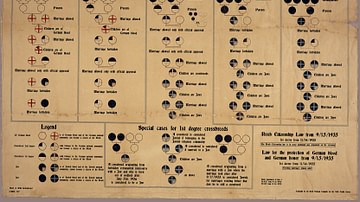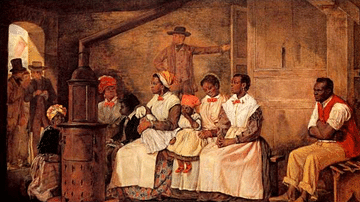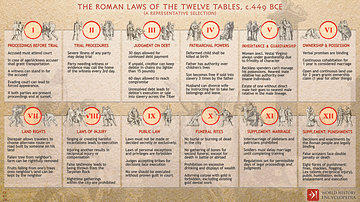Search
Remove Ads
Advertisement
Summary 
Loading AI-generated summary based on World History Encyclopedia articles ...
Search Results

Definition
Nuremberg Laws
The Nuremberg Laws of September 1935 were a set of racial laws which set out a number of restrictions on Jewish people such as depriving them of the right to German citizenship and right to marry non-Jews. Amendments to the laws then defined...

Article
Virginia Slave Laws and Development of Colonial American Slavery
Racialized chattel slavery developed in the English colonies of North America between 1640-1660 and was fully institutionalized by 1700. Although slavery was practiced in the New England and Middle colonies, and Massachusetts Bay Colony passed...

Image
The Roman Laws of the Twelve Tables, c. 449 BCE
An infographic illustrating The Laws of the Twelve Tables were a set of ancient Roman laws put together and displayed in public around 450 BCE. These laws formed the core of the Roman legal system and provided a written code of conduct and...

Image
Book of Nuremberg Laws
A book containing the Nuremberg Laws, a set of race and citizenship laws for Jewish people and German citizens which were created in Nazi Germany in September 1935. Part of an exhibition at the Oslo Center for Studies of the Holocaust and...

Definition
Code of Hammurabi
The Code of Hammurabi was a set of 282 laws inscribed in stone by the Babylonian king Hammurabi (r. 1795-1750 BCE) who conquered and then ruled ancient Mesopotamia. Although his law code was not the first, it was the most clearly defined...

Image
The Hittite Laws Tablet from Hattusa
This tablet's text is one of the latest versions of the Hittite laws text. In spite of some modifications (for example from the 16th century BCE versions), the articles of these two versions run parallel to each other. One of the articles...

Definition
Montesquieu
Montesquieu (1689-1757) was a French philosopher whose ideas in works like The Spirit of the Laws helped launch the Enlightenment movement in Europe. His ideas on the separation of powers, that is, between the executive, legislative, and...

Article
Clothes in the Elizabethan Era
Clothes in the Elizabethan era (1558-1603 CE) became much more colourful, elaborate, and flamboyant than in previous periods. With Elizabeth I of England (r. 1558-1603 CE) herself being a dedicated follower of fashion, so, too, her court...

Definition
Twelve Tables
The Twelve Tables (aka Law of the Twelve Tables) was a set of laws inscribed on 12 bronze tablets created in ancient Rome in 451 and 450 BCE. They were the beginning of a new approach to laws which were now passed by government and written...

Definition
Code of Ur-Nammu
The Code of Ur-Nammu (c. 2100-2050 BCE) is the oldest extant law code in the world. It was written by the Sumerian king Ur-Nammu (r. 2047-2030 BCE) or his son Shulgi of Ur (r. 2029-1982 BCE) centuries before the famous Code of Hammurabi was...